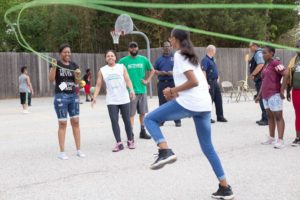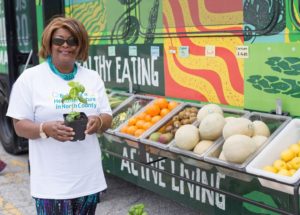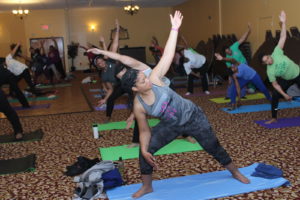How did you get started working in the food system?
In high school I planned on being a physical therapist. I went to SLU, graduated with a B.S. in Exercise Science. I worked as a physical therapy aide, as I intended on applying for Physical Therapy graduate programs. However, my exposure to the healthcare system those few years showed me that the real way to help people is not when they are in need of medical care; it’s in equipping individuals with the tools that can aid in the prevention of the long list of chronic disease and illness that can be avoided with engaging in healthy behaviors. I went back to graduate school, obtained my Masters in Public Health from the Brown School, and set out to improve health disparities related to obesity in the Black community. My studies there provided me with the language and ability to locate the evidence showing that the problem goes beyond knowing how to prepare healthy meals.
The real conundrum in Black communities is finding where you can purchase healthy foods. That’s when I realized that my knowledge within the physical activity realm is serving me well in this capacity. However, being involved in the food system is a necessity in order to alleviate the health disparities that prevail in the St. Louis region.
What part of the food system do you work on?
The program I spearhead, WEDO, is an acronym for Women Empowered to End Disparities in Obesity. It was formed through a collaboration between Missouri Foundation for Health’s Healthy Schools Healthy Communities Initiative and the Gateway Region YMCA. In my current role as WEDO Wellness Coordinator, I work with North County mothers and female caregivers to support them in creating healthier homes and communities for themselves and their families. I assist with the development, implementation, and evaluation of programming that focuses on increasing healthy eating behaviors.
In addition to nutrition education, WEDO also increases awareness among mothers about the places where they can purchase healthy foods affordably in their communities. The Double Up Food Bucks program, St. Louis MetroMarket North County stops, and the United People Market have all been promoted among WEDO program participants. In addition, WEDO is working with organizations, like the St. Louis Food Policy Coalition, to assist with the improvement of healthy food accessibility throughout the St. Louis region.
What is the mission of Gateway YMCA?
The mission of the Gateway Region YMCA is to put Christian principles into practice through programs that build healthy spirit, mind, and body for all.
What do you wish people knew about the food system in St. Louis?
We all know that the food system in St. Louis is far from perfect. However, there are individuals and organizations working together to find solutions to improve it. This is something I wish people knew about the local food system. Gateway Greening, University of MO-Extension, Operation Food Search, St. Louis City & County Health Departments, and of course the St. Louis Food Policy Coalition are just a few examples of the efforts currently taking place to work on the challenges that our food system faces. Working in this capacity has afforded me the opportunity to become more aware of these efforts, and makes me feel hopeful that we will see some benefits in the future for the work that is currently taking place.
I would also like to point out that there have been some successes. While more work needs to be done, there have been some small wins. Seeing the emergence of St. Louis MetroMarket in North County and the popularity of those stops among community members is proof for businesses, farmers, and others to see that North County residents not only want healthy foods but will actually purchase them. While there is more work to be done, there are signs that efforts are working.
How do you envision the future of the food system in St. Louis?
As I mentioned in my previous answer, I remain hopeful for the future of the food system in our region. As more individuals are becoming more conscious of where their food comes from, and the demand for more local produce increases, it’s only a matter of time before the distribution to meet those needs in ALL areas of the region will occur. Not only that, but people are becoming more interested in growing their own herbs and produce (myself included!).
There is a movement around healthy food accessibility and sustainability that is growing throughout the region. Slowly, but surely, I believe that food system changes will be led by the people in these regions. And when people unite, things happen, and change occurs. I am hopeful that the people will bring about the much needed changes within the St. Louis food system.




